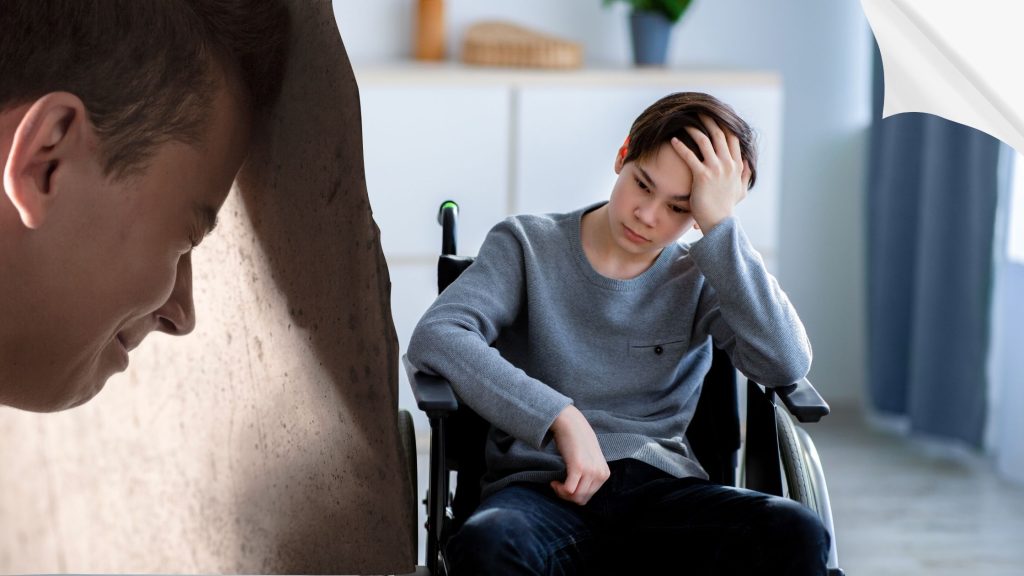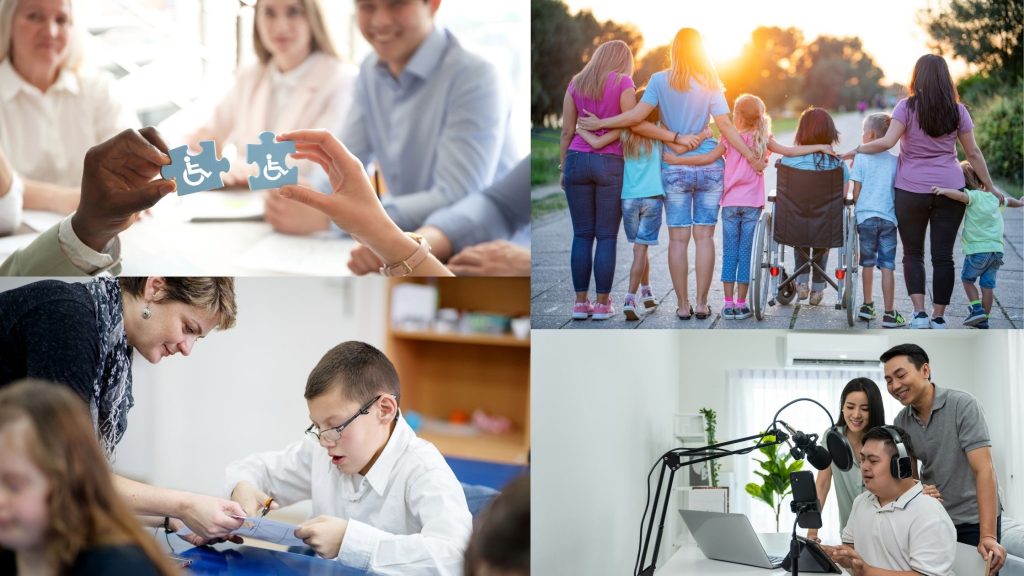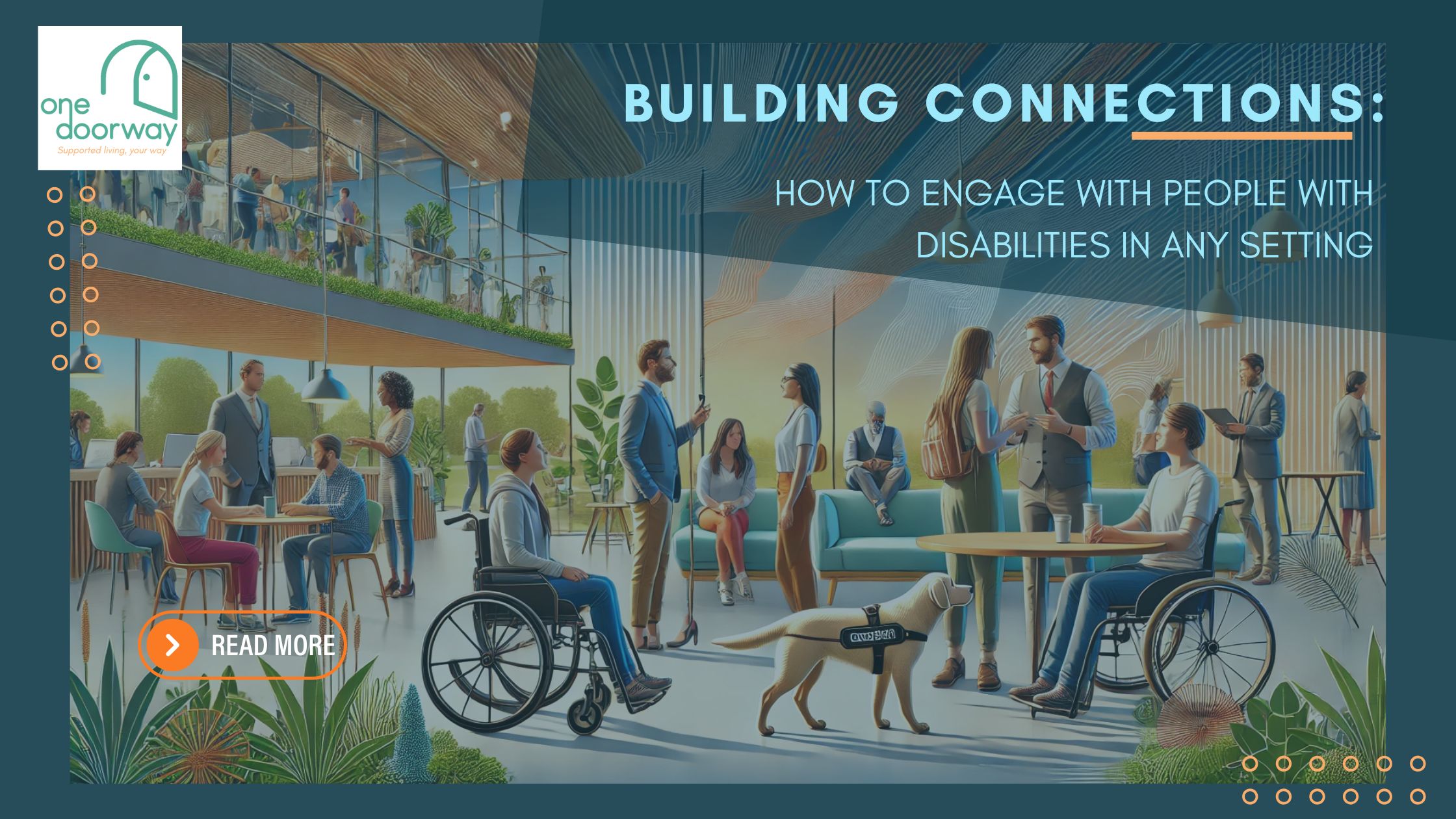Creating Strong Support Networks for Disabled Teens and Families

18 April, 2024
While families navigating the complexities of raising disabled teens face unique challenges, the promise of brighter futures shines through with strong support networks. Dive into this blog with us as we explore the importance of fostering resilient support systems and discover how One Doorway’s vision, mission, and values come together to offer tailored services designed to enhance the lives of disabled teens and their families.
Navigate Roadblocks
Life for families with disabled teens isn’t always smooth sailing. From facing inaccessible spaces to battling societal stereotypes, there are many hurdles. One major roadblock? The lack of robust support networks. Too often, families find themselves grappling with a shortage of resources and services, leaving them feeling isolated and disheartened. Misunderstandings about disability only add fuel to the fire, fostering social exclusion and discrimination.
But guess what? Hidden within these challenges are opportunities for growth and empowerment. Disabled teens bring unique strengths and perspectives to the table, enriching our society in ways unimaginable. By nurturing inclusive communities and tailoring support services, we unleash their full potential. And let’s not forget the vital role families play in crafting these support networks. Through mutual support and advocacy, they foster a sense of belonging and unity.

Why Support Networks Matter
Navigating the daily life of a disabled teen and their families can be scary. From accessing educational opportunities to finding inclusive social activities, the journey is often riddled with obstacles.
This is where strong support networks play a crucial role because they:
- Offer emotional support, providing comfort and reassurance during challenging times.
- Provide practical assistance, guiding individuals through complex systems and offering resources.
- Cultivate a sense of belonging, fostering connections and reducing feelings of isolation.
- Empower individuals to recognise their strengths, pursue their goals, and develop confidence.
- Build resilience by offering strength, encouragement, and perspective during adversity, helping individuals bounce back stronger.
These networks serve as the bedrock of individuals’ journeys towards growth, resilience, and a sense of belonging.

Building Resilient Support Networks
In the journey of families with disabled teens, forging strong support networks is paramount. These networks cultivate a sense of community, understanding, and empowerment, offering invaluable resources for navigating challenges. Empowerment stands as a cornerstone in constructing these networks. By equipping families and disabled teens with the tools to advocate for themselves and access essential resources, organisations like One Doorway facilitate more effective navigation of the challenges they encounter.
In Australia, families with disabled teens find solace and empowerment through a variety of dedicated support organisations. Here’s a glimpse into some key players:
1. Australian Federation of Disability Organisations (AFDO): AFDO serves as a potent voice for individuals with disabilities nationwide. As a Disabled People’s Organisation (DPO), they champion advocacy, representation, and community engagement to ensure the rights and inclusion of people with disabilities in all facets of society.
2. Disability Advocacy Network Australia (DANA): DANA stands as a national peak organisation, fiercely advocating for the rights and interests of individuals with disabilities. Through a robust network of advocacy groups, DANA ensures their voices resonate in decision-making processes and facilitates access to vital services and support.
3. Children and Young People with Disability Australia (CYDA): CYDA is a national beacon for children and young people with disabilities and their families. Offering advocacy, information, and support, CYDA empowers disabled teens to fully participate in education, employment, and community life while spearheading systemic change for greater inclusivity.
4. National Disability Insurance Scheme (NDIS): The NDIS, a government-funded initiative, delivers personalised support and services to individuals with significant disabilities. Through tailored support plans, it enhances independence, social participation, and overall well-being, offering families access to therapies, assistive technology, and community programs.
5. National Disability Services (NDS): NDS stands as the premier body for non-government disability service providers in Australia. Their mission revolves around fostering excellence, innovation, and sustainability in the sector. NDS equips service providers with the tools and knowledge to support disabled teens and their families, ensuring access to high-quality services.
In essence, these support networks offer huge resources and opportunities for disabled teens and their families to thrive. Through advocacy, hands-on assistance, and systemic efforts, they lay the groundwork for increased inclusivity, equality, and social justice for individuals with disabilities.
Making a Difference, One Doorway at a Time
At One Doorway, we’re driven by a profound vision: nurturing fulfilment for every individual, including families with disabled teens. Our commitment to holistic support and empowerment acknowledges the diverse needs within our community. Aligned with this vision, our mission is to curate services that elevate the quality of life and fulfil individual outcomes. Prioritising personalised needs ensures our support is comprehensive and finely attuned to each participant and the teens family.
Central to our ethos are guiding values of inclusiveness, respect, diversity, and equality. These principles underpin our commitment to providing accessible, respectful, and inclusive support to all individuals.
In addition, One Doorway offers a tailored range of services, from counselling to community outreach, addressing the diverse needs of families. Through personalised plans and dedicated professionals, we empower families and participants to thrive, building stronger connections and brighter futures with empathy and inclusivity.
In closing, let us remember that building strong support networks is not just about overcoming challenges; it’s about creating a community of belonging, understanding, and solidarity. Together, we can pave the way for a more inclusive and empowered future for disabled teens and their families, where everyone is valued and supported on their journey towards fulfillment.


